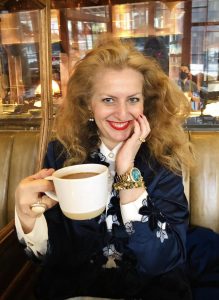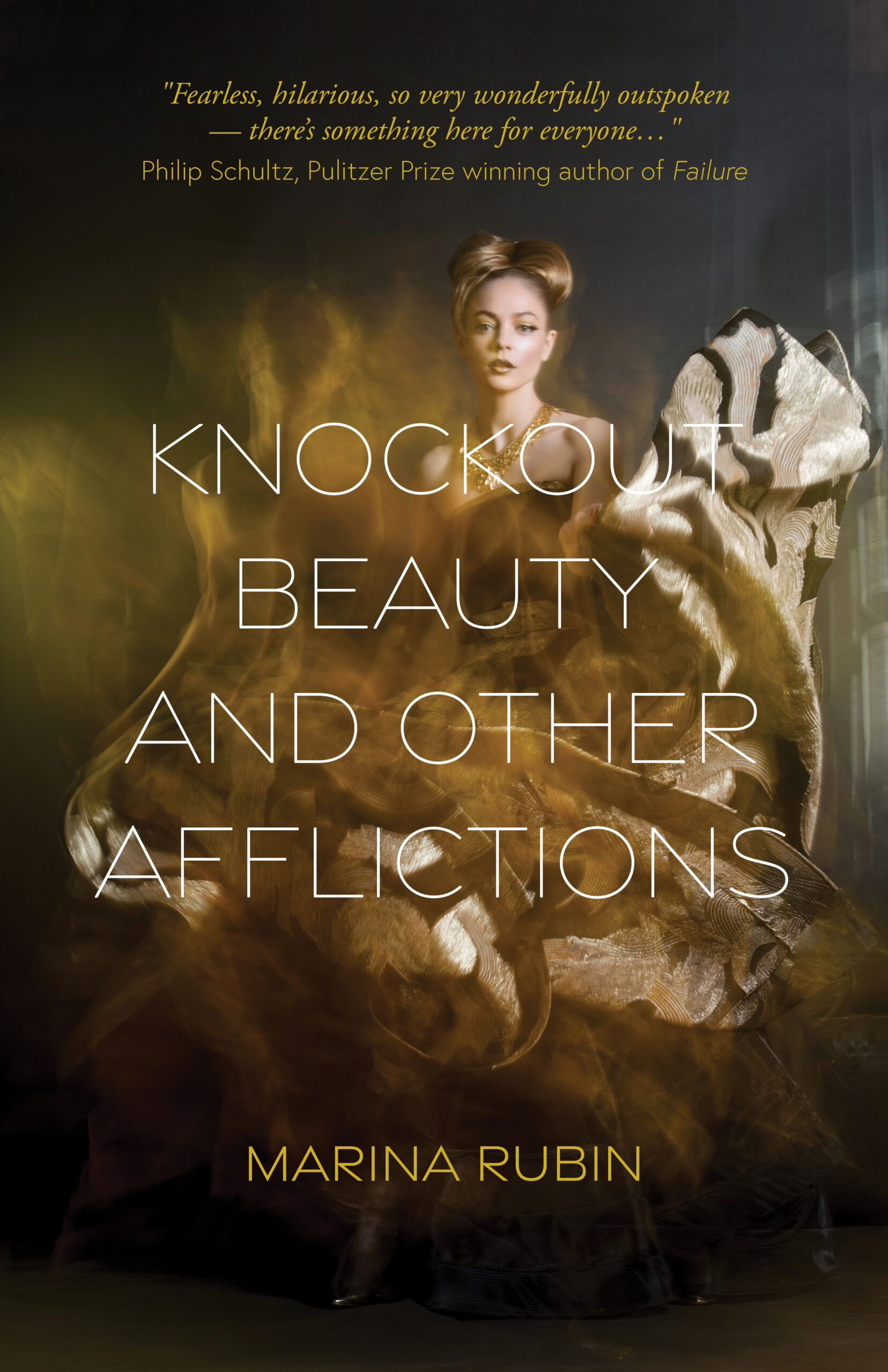
Marina Rubin
SD: What writers have influenced you in creating this superb story collection? Have your reading tastes changed as you’ve developed as a writer?
MR: When I was writing Knockout Beauty and Other Afflictions I wanted to channel some of my favorite female voices in literature… and

Stephanie Dickinson
I am not talking about the moderns, but rather the classics, from around the world, who pioneered the art of women’s fiction (the female narrative, the emotion, the nuance) like Colette, Jean Rhys, Francoise Sagan, Isabel Allende, as well as Dorothy Parker, Lorrie Moore, Miranda July. When it came to the actual form, the technicality of composing short prose, I used everything I learned from O. Henry; in my opinion, he is the master of storytelling in this genre, there is no one like him.
SD: I am particularly struck by the richness of your language. I see the playfulness and exuberance of Nabokov in Knockout Beauty and Other Afflictions, particularly the lushness of your vocabulary. Like you, English was not Nabokov’s first language and so I am even more impressed. How did you learn English and what are some of the advantages for a writer in being multilingual as well as the challenges you’ve encountered writing in English?

MR: Wow, no one compared me to Nabokov before; it’s so not deserved, ha. But I do feel fortunate to have two languages in my pocket when writing (Russian and English,) because it expands the pool of words I have at my disposal, hence increasing my range of perception. Sometimes I might have a word in Russian that really hones down on that emotion, and it gives me the pathway to finding the corresponding word for it in English that might not have been so apparent if I knew only English; and vice versa. As for learning the language, I came to US when I was a tween and I learned English by watching TV non-stop, specifically “Married with Children.” So technically, I started writing with the vocabulary of a shoe salesman!
SD: Your prose has the precision of poetry. Do you use online dictionaries and thesauruses? What about Grammarly? I suspect you don’t and yet you find the right word. “There was a tiny music box on my nightstand, a Hanukkah gift. If you turned the knob, it played Yellow Submarine. There was also a silver candlestick, not taller than my index finger; and in the kitchen was a cutting board, so small it could only fit one slice of cheese, and maybe a mouse.” ‘Man in a Fedora.’ I was delighted that this music box played Yellow Submarine.
MR: You are very perceptive! Yellow Submarine, ha. My background is in poetry. Before Knockout Beauty, I wrote 3 chapbooks of poetry and 1 of flash fiction, so I grew up on the philosophy of “economy writing” where every word must be accounted for and thought-out. When you are used to writing in such constricting form, that style translates into your prose. That could be a potential problem because your prose could come out too dense and difficult to digest, I am always aware of that danger and try to avoid it. But I do labor over every word, and I do seek out the right name, the accurate phrase to express this or that, it’s important to me. I use Thesaurus in Word, but nothing more advanced. No on Grammarly. I should try it.
SD: There has been a tendency to move into a more reportorial style of writing in literature away from the textures we see in Knockout Beauty and an even stronger tendency to bring in a political discourse. These stories seem unapologetically about people who want nose jobs and clothes, a dependable cleaning lady, a date, a travel junket, people in pain but who enjoy a well-laden table. Do you choose your subject matter, or does it choose you? Are the delicious characters you populate your stories with based on real-world people or composites?
MR: I am not a wildly imaginative writer, so I tend to write about things that I know. I don’t write about politics as I don’t know much about it, and it does not interest me. What I do know is LIFE, and I consider my writing simply a mirror of my surroundings – life in all its “knockout beauty and boredom” (that’s from “Man in a Fedora.”) Whether you like it or not, humans are about nose jobs and clothes and dates, and travel, and sex, and rejection, and waiting, and they are all terribly flawed and very endearing, and of course, I choose them, the more imperfect the better! Some of the characters are based on real-life people, at least partially, and others are composites of perhaps several people I had met, and then I sprinkle them with fictional issues and throw them into circumstances beyond their control and see how they make out.
SD: You incorporate a marvelous element of humor in your work. Your comedic timing is natural and on point. A major lit mag recently put out a call for humorous writing and expressed the opinion that humor is difficult for the contemporary writer. In their short story collections Bonnie Jo Campbell and Annie Proulx employ humor of a more cynical and grim variety. Can you talk about the use of humor in your writing? How it enhances and enlivens your stories?
MR: I consider myself a humor writer, or rather a “tears through laughter” kind of writer. I think there is comedy everywhere in life, especially in those grim moments, and humor comes very easily for me, I don’t even need to think about it. Even in this collection, in the story “Jaula” I had managed to make a depressed young man who is terrified of going to a funeral, ask a pretty girl out on a date and have her tell him, “You don’t need a date for a funeral, it’s not that kind of event…” I remember laughing as I wrote this scene, thinking is this too much. Is it cynical and grim humor? Sure. But there is a great quote that goes something like this: “There is a thin line that separates laughter and pain, comedy and tragedy, humor and hurt.” And that’s the essence of this book, really – the pendulum between hurt and hilarity.
SD: Your opening lines often jumpstart your stories. It’s as if the first sentence lays out the plot, and then the writing goes on to illuminate and flesh out that initial line. You get enormous energy with just the right first sentence. A few examples follow.
You begin ‘Jaula’ and the entire collection with “The most famous living Latin American writer had come to town.” Then you compare the advertising circulars to brooding doves, which sets beautifully the tone and the narrator’s voice. ‘Man in a Fedora’ starts with a stunner. “It was because he was dead that I started looking for him.” ‘You Can Live With this Nose’ commences with “My mother is giving me ten thousand dollar for a nose job.” And “She loved clothes more than she loved people” launches ‘Valentino.’ How do you capture those first lines and know they’re absolutely right?
MR: This writing technique is crucial for me. I learned it in Iowa Writers International Online program, and I follow this advice like the Torah! If your character has a terrible secret, do not wait until page 50 to reveal it! In fact, that secret is your first line, that’s where your story begins and from there you work out the plot. A lot of novels spend the first 30 pages creating the setting. I think it’s unnecessary and ineffective. I believe in throwing the reader into action from the first line, make them involved, put them in the audience greeting the most famous living Latin American writer, make them mourn the man in a fedora, force them to wonder how much money the mother is giving her for a nose job. That kind of investment from the reader is essential because after all, book writing is a conversation between a writer and a reader.
SD: Is your writing enriched by your travel? Was ‘She Works Hard for the Money’ inspired by actual events? A tour group visiting Thailand is taken to a club to watch live entertainment. The performer opens a Coke bottle with her vagina. “Then she placed it on the wooden stage, spread her legs, widened her stance, and squatted all the way down until the bottle landed in her vagina.” It’s a story you can’t look away from. Were there any cultural decisions you had to make when writing this?
MR: I do write about my travels, occasionally, when there is a story. “She Works Hard for the Money’ was a very risqué decision for me. I wanted to write it as a travel essay, describing a ping-pong show in Bangkok, certainly a travel novelty if there ever was one. However, I wanted to incorporate the reactions of unsuspecting tourists sitting in the audience. That’s why it became a story as opposed to a TripAdvisor review, ha. I also wanted to write it from the viewpoint of a woman, looking at female “sex workers” and seeing them as “performers.” I did stumble onto some criticism of this story; someone said it was offensive to women of this profession, which I think is the opposite of what I was trying to do – elevate them and explain this cultural phenomenon in a way that would give me and the reader a certain degree of knowledge. I had another reader praise this story by saying: “you made something so X-rated look completely not vulgar…” I guess, all this is the conversation between a writer and a reader that I was referring to, and that’s priceless.
Stephanie Dickinson lives in New York City with the poet Rob Cook and their senior feline, Vallejo. She is the editor of Rain Mountain Press. Her novels Half Girl and Lust Series are published by Spuyten Duyvil, as is her feminist noir Love Highway. Other books include Heat: An Interview with Jean Seberg (New Michigan Press), and Flashlight Girls Run (New Meridian Arts Press). Blue Swan/Black Swan: The Trakl Diaries won the 2020 Bitter Oleander Press book prize. Her Razor Wire Wilderness, a true crime memoir, based on her correspondence with inmates at the notorious Edna Mahan Correctional Facility for Women is out from Kallisto Gaia Press.
Marina Rubin was born in Vinnitsa, Ukraine, and immigrated to the United States in 1989. She is an associate editor of Mudfish, a 2013 recipient of COJECO Blueprint Fellowship, and the author of the critically acclaimed flash fiction collection, Stealing Cherries (Manic D Press.) Her short story collection, Knockout Beauty and Other Afflictions (Crowsnest Books) has received an Honorable Mention for the 2020 Miami Book Fair Emerging Writer Fellowship. In addition to writing, Marina is an avid mountaineer, having summited Kilimanjaro, made it to Everest Base Camp, completed Tour du Mont Blanc and Camino de Santiago. She lives in Brooklyn.
Knockout Beauty and Other Afflictions is available from the publisher: https://www.crowsnestbooks.com/product/knockout-beauty/